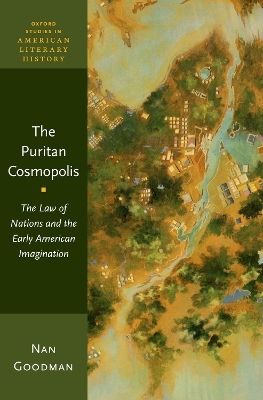
The Puritan Cosmopolis
The Law of Nations and the Early American Imagination
Seiten
2018
Oxford University Press Inc (Verlag)
978-0-19-064282-2 (ISBN)
Oxford University Press Inc (Verlag)
978-0-19-064282-2 (ISBN)
In The Puritan Cosmopolis, Nan Goodman demonstrates how the Puritans were far from an insular coterie that ignored the larger global community. Drawing on letters, diaries, political pamphlets, poetry, and other cultural materials, The Puritan Cosmopolis demonstrates how the Puritan population increasingly saw themselves as global citizens.
The Puritan Cosmopolis traces a sense of kinship that emerged from within the larger realm of Puritan law and literature in late seventeenth-century New England. Nan Goodman argues that these early modern Puritans -- connected to the cosmopolis in part through travel, trade, and politics -- were also thinking in terms that went beyond feeling affiliated with people in remote places, or what cosmopolitan theorists call "attachment at a distance." In this way Puritan writers and readers were not simply learning about others, but also cultivating an awareness of themselves as ethically related to people all around the world. Such thought experiments originated and advanced through the law, specifically the law of nations, a precursor to international law and an inspiration for much of the imagination and literary expression of cosmopolitanism among the Puritans. The Puritan Cosmopolis shows that by internalizing the legal theories that pertained to the world writ large, the Puritans were able to experiment with concepts of extended obligation, re-conceptualize war, contemplate new ways of cultivating peace, and rewrite the very meaning of Puritan living. Through a detailed consideration of Puritan legal thought, Goodman provides an unexpected link between the Puritans, Jews, and Ottomans in the early modern world and reveals how the Puritan legal and literary past relates to present concerns about globalism and cosmopolitanism.
The Puritan Cosmopolis traces a sense of kinship that emerged from within the larger realm of Puritan law and literature in late seventeenth-century New England. Nan Goodman argues that these early modern Puritans -- connected to the cosmopolis in part through travel, trade, and politics -- were also thinking in terms that went beyond feeling affiliated with people in remote places, or what cosmopolitan theorists call "attachment at a distance." In this way Puritan writers and readers were not simply learning about others, but also cultivating an awareness of themselves as ethically related to people all around the world. Such thought experiments originated and advanced through the law, specifically the law of nations, a precursor to international law and an inspiration for much of the imagination and literary expression of cosmopolitanism among the Puritans. The Puritan Cosmopolis shows that by internalizing the legal theories that pertained to the world writ large, the Puritans were able to experiment with concepts of extended obligation, re-conceptualize war, contemplate new ways of cultivating peace, and rewrite the very meaning of Puritan living. Through a detailed consideration of Puritan legal thought, Goodman provides an unexpected link between the Puritans, Jews, and Ottomans in the early modern world and reveals how the Puritan legal and literary past relates to present concerns about globalism and cosmopolitanism.
Nan Goodman is Professor of English at the University of Colorado Boulder and the author of Banished: Common Law and the Rhetoric of Social Exclusion in Early New England (2012), and Shifting the Blame: Literature, Law, and the Theory of Accidents in Nineteenth-Century America (1998).
Prologue
Chapter 1: The Law of Nations and the Sources of the Cosmopolis
Chapter 2: The Cosmopolitan Covenant
Chapter 3: The Manufactured Millennium
Chapter 4: Evidentiary Cosmopolitanism
Chapter 5: Cosmopolitan Communication and the Discourse of Pietism
Epilogue
| Erscheinungsdatum | 15.03.2018 |
|---|---|
| Reihe/Serie | Oxford Studies in American Literary History |
| Verlagsort | New York |
| Sprache | englisch |
| Maße | 239 x 157 mm |
| Gewicht | 431 g |
| Themenwelt | Geisteswissenschaften ► Geschichte ► Regional- / Ländergeschichte |
| Geschichte ► Teilgebiete der Geschichte ► Militärgeschichte | |
| Geisteswissenschaften ► Sprach- / Literaturwissenschaft ► Anglistik / Amerikanistik | |
| Geisteswissenschaften ► Sprach- / Literaturwissenschaft ► Literaturwissenschaft | |
| Recht / Steuern ► Rechtsgeschichte | |
| Sozialwissenschaften ► Politik / Verwaltung | |
| ISBN-10 | 0-19-064282-3 / 0190642823 |
| ISBN-13 | 978-0-19-064282-2 / 9780190642822 |
| Zustand | Neuware |
| Haben Sie eine Frage zum Produkt? |
Mehr entdecken
aus dem Bereich
aus dem Bereich
neueste Manipulationstechniken als Waffengattung der NATO
Buch | Softcover (2023)
Westend (Verlag)
24,00 €
Deutschlands Schwäche in der Zeitenwende
Buch | Softcover (2023)
C.H.Beck (Verlag)
18,00 €


